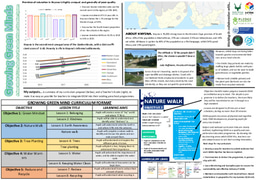‘Growing Green Minds’ – Lessons in Ethical Leadership and Global Citizenship from my LiA in Knysna, South Africa
The video above provides some context for my Leadership in Action project, which involved developing an eco-curriculum for preschool children in South Africa, working with the Knysna Education Trust (KET). Over my four-week project, I learnt some valuable lessons in ethical leadership, good global citizenship, and personal growth:
- The importance of ‘rapid prototyping’ in forgiving, but new, environments. At KET, I was surrounded by lots of experienced, but very busy, Early Childhood Development professionals. Given their wealth of knowledge – and my distinct lack of it – it seemed not only tempting, but also morally intuitive, to run every single one of my embryonic ideas past them. On the other hand, given the staff’s incredibly busy schedules, it was unfair to expect that they’d be constantly on hand to validate these ideas! A solution which struck the balance was ‘rapid prototyping’: rather than presenting a polished (but potentially misdirected and counterproductive) plan, or an embryonic plan (leaving KET staff with little material to feedback on, wasting their valuable time), rapid prototyping offered low-fidelity plans, which could be improved efficiently. In an unfamiliar environment, mistakes in project delivery were inevitable, but the supportive atmosphere of KET and iterative nature of rapid prototyping meant that this proved to be an important takeaway.
- Work with, not for. For a project that was particularly vulnerable to ‘white saviour’ accusations, it was important that the partnerships between the other stakeholders and I were based on mutual respect, not paternalism. This involved learning some hard lessons pretty quickly: not everyone my project targeted was interested in it – when you’re a South African living on less than £7 per day, feeding your family is the priority, not cutting your plastic waste. Attempting to build a strong cultural awareness, working well within the resource constraints, and approaching problems with an open mind gave me the best chance of forging respectful and constructive relationships.
- Time spent in planning is rarely wasted, time spent in reconnaissance is never wasted. As William MacAskill warns in Doing Good Better, intuition is a poor guide for effective altruism. I started by intuitively basing the project around my idea of a target audience, my idea of resource constraints, and my idea of the developmental milestones which my curriculum needed to hit. However, I quickly realised that whilst some time needed to be spent working on the curriculum from a desk, the school’s contexts and challenges (which the curriculum would be written around) could only be fully understood by being on the ground.
Thank you for taking the time to read about my LiA project, along with some of the lessons I learnt about ethical leadership and my role as a global citizen. If you have any questions, please don’t hesitate to contact me through the Laidlaw Scholars Network, and I’d love to chat!

Please sign in
If you are a registered user on Laidlaw Scholars Network, please sign in